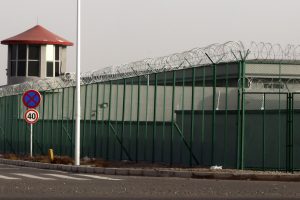A former Chinese diplomat and United Kingdom-based supporter of the brutal regime in Beijing claims that people inside and outside the country must unquestioningly accept Chinese Communist Party General Secretary Xi Jinping’s rule. This is, Victor Gao asserted, a “mega-trend of our time.”
In the same session of journalist Mehdi Hasan’s “Head to Head” program, Gao also endorsed the idea of loyalty pledges, callously dismissed audience members’ queries about wrongfully detained family members, and even ducked questions about analyses based on Chinese government data. To Gao, the “mega-trend” appears to be unconditional impunity for any and all Chinese government human rights abuses.
But fresh information about ongoing, systematic, and widespread Chinese government atrocity crimes in the Uyghur region – where millions of people have been arbitrarily detained, tortured, separated from family members, and subjected to cultural persecution, simply because of their distinct identity – demonstrates strong support for the real trend of international accountability.
In a newly published analysis of patterns of incarceration and legal manipulation, scholars Rayhan Asat and Min Kim tallied the number of years of wrongful detention inflicted on Uyghurs: “a cumulative total of 4.4 million years of imprisonment.” Beijing’s genocide and crimes against humanity, the authors argue, also reflect a disturbing attempt at “authoritarian lawfare” – in effect, that the Chinese authorities have continued to try to justify their patently illegal conduct by calling it the opposite. The tactic is designed to minimize international scrutiny and discourage the pursuit of accountability.
In a calmly delivered, utterly chilling TEDxCornell talk in July, student and social activist Zilala Mamat described belatedly learning of the death of her grandfather, Obul Nur, and the fact that his body was dumped in an unmarked grave. Mamat also spoke about learning that her aunt, Arzigul Abdurehim, had died in the region, as had a young woman, Rahile Omer, who was arbitrarily detained in 2018 at the age of 15. Reflecting on the differences between her own experience and Omer’s, Mamat spoke movingly of remembering as resistance – and condemned what she called the “deafening silence of the world” in the face of Beijing’s assault on Uyghurs.
Asat and Mamat are right to urge democratic governments and United Nations human rights bodies to recommit to the project of investigations into and accountability for the Chinese government and CCP officials implicated in international human rights crimes.
August 31 will mark two years since the United Nations Office of the High Commissioner for Human Rights published an assessment of violations across the Uyghur region, concluding that state policies may constitute crimes against humanity. High Commissioner Volker Turk, who assumed office weeks after that report’s publication, has yet to share any information about his ongoing discussions with Chinese authorities or his efforts to find Uyghurs’ missing family members, nor has he briefed the U.N. Human Rights Council (HRC) about any aspect of this work. These failures – easily remedied – undermine the quest for accountability.
Some democracies have adopted new laws to minimize complicity in Chinese state-sponsored forced labor across the Uyghur region, improved protections against Beijing’s efforts to intimidate Uyghurs in other countries, and condemned Xi’s abuses in international forums. But virtually all democracies have yet to deploy universal jurisdiction laws – which allow for the prosecution of serious human rights crimes outside the country in which those crimes were committed – to enable prosecutions against Chinese state and CCP officials.
Academics, journalists, and human rights organizations have compiled considerable evidence; the Xinjiang Victims Database is a grim trove of information for a prosecutor’s brief. But democracies continue to prioritize other perceived interests in their relationships with Beijing, refraining from deploying an approach that could have a transformative and deterrent effect.
Turk and the foreign ministers of concerned democracies should prepare to mark the second anniversary of OHCHR report by recommitting to the pursuit of justice for millions of Uyghurs. International efforts in this same period have sought such an outcome for people in Myanmar, Syria, and Ukraine. It’s clear that Beijing, which validates Asat’s concern about authoritarian lawfare when it dismisses the OHCHR report as “illegal,” will not abandon its multiple campaigns of repression absent significant pressure.
To counter Gao’s “mega-trend,” Uyghurs and others inside and outside China need strong, coordinated steps toward investigations and prosecutions of Xi and others complicit in atrocity crimes. Those guilty of these heinous abuses should know they will not only face hard questions in the court of public opinion, but also in a court of law.

































